How We Organize: Saving the Hudson River from Radioactive Waste
Published Apr 1, 2024
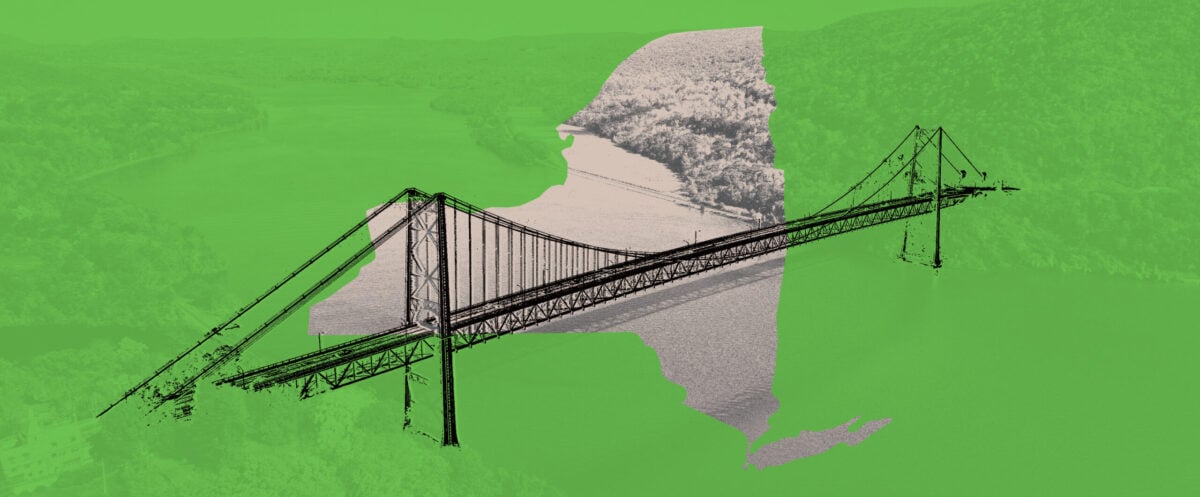
Ever wonder what it takes to build a winning campaign? Our New York team shares the key strategies and tactics in their rapid-response effort to Save the Hudson.
Before I came to Food & Water Watch, I didn’t know much about organizing. Like many folks, I supported and donated to organizations and celebrated their victories. But I always wondered — how did it happen? How did they plan, strategize, and reach their goals? What were the “nuts and bolts” of building a win?
Since joining Food & Water Watch, I’ve learned a lot about exactly that. Each campaign is unique — tailored to the context on the ground, the allies we’re working with, and our final goal. There are so many moving parts and people involved; so many tactics, angles, and avenues that our organizers and volunteers pursue to meet their goals.
And meet them, they do. Again and again, Food & Water Watch overcomes big money and long odds. We proudly declare victory and build on it. We work with communities to fight corporate greed and pollution, while also moving the needle on the biggest food, water, and climate issues of our time.
In this series, “How We Organize,” organizers and volunteers on the front lines of these issues peel back the curtain and talk shop, detailing all those nuts and bolts. If you’ve ever wondered how we organize and win, you’re in the right place.
Our first stop is New York’s Hudson Valley and last year’s “Save the Hudson” win.
Kicking Off Our Effort to Save the Hudson
In the opening weeks of 2023, the Food & Water New York team caught wind of an outrageous proposal to dump radioactive waste in the Hudson River.
A company called Holtec was in charge of decommissioning the Indian Point nuclear power plant. It proposed dumping the plant’s radioactive waste in the already-burdened Hudson River. Holtec submitted a plan with a dump date set for August 2023. Then, in April, it moved up the date to May. And this unsettlingly fast turnaround made little time for public input.
But our New York team knew it had a chance of stopping it, if it acted quickly and strategically. So the team jumped into action, kicking off a six-month campaign with grassroots organizing and lobbying at its heart. By August, Governor Kathy Hochul signed the “Save the Hudson” bill, which banned nuclear waste dumping from decommissioning power plants in the Hudson River.
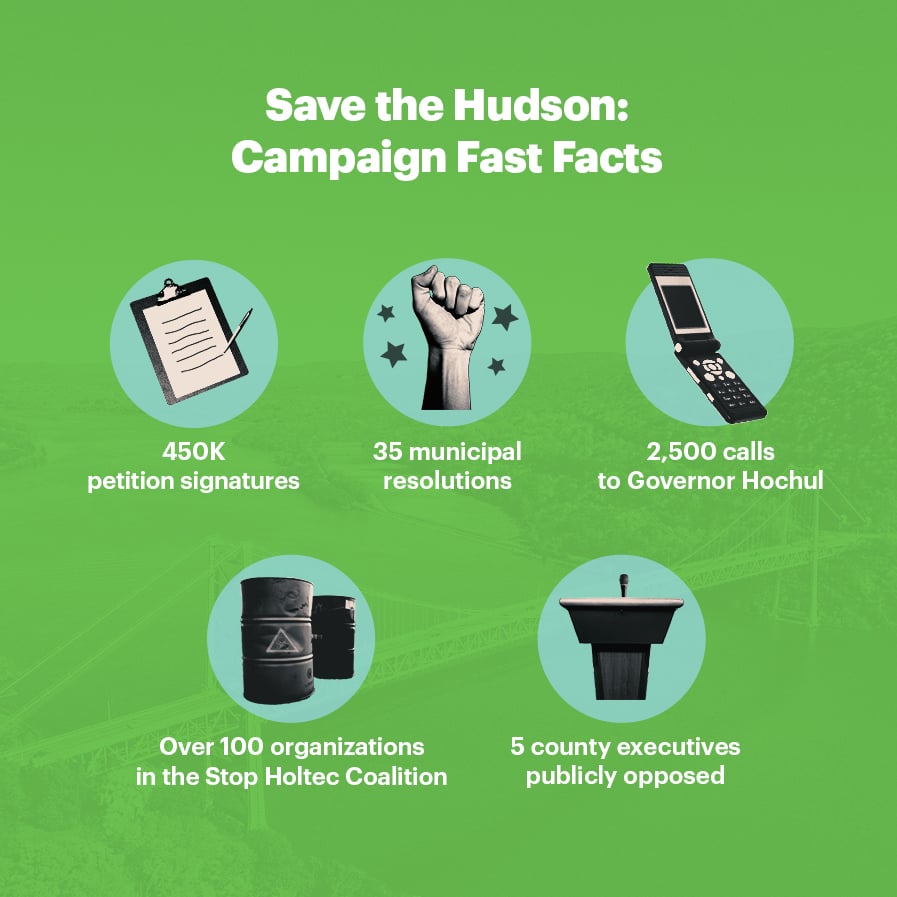
In this interview, Senior New York Organizer Santosh Nandabalan and Campaign Lead and Volunteer Leader Iris Hiskey Arno break it all down for us. This interview has been edited for clarity and length.
Using Our Theory of Change to Set the Strategy
Mia: Like many organizations, Food & Water Watch is grounded in our “theory of change” — a model of how we can bring about the change we want to see in the world. Can you explain our theory of change and how you applied it to this campaign?
Santosh: Our theory of change is basically to get a decision-maker to implement either an action or a goal we want. So before we started this campaign, we really took a step back to identify who could give us what we wanted, and then we built a campaign around pressuring that person.
This was kind of a messy campaign in that there are a lot of regulatory agencies. We knew from the onset that the federal regulatory agencies weren’t going to do what we wanted. And the state agencies really follow the Governor here in New York.
So for us, we saw the Governor as the person who has the power to give us what we want, and that informed our decision to say, “Hey, we’re going to build a campaign around pressuring Governor Hochul with legislation, with actions, with a lot of distributed organizing.” Ultimately, she’s the one who can stop the dumping, so that was what shaped all our tactics.
We clearly saw that Governor Hochul needs a base of environmentalists to continue to be elected. She needs to do what those people say in order to continue doing her job. So for us, targeting Governor Hochul was really important because she was the decision-maker, and we figured — with enough public opinion — we could actually affect her, as opposed to those agencies.
Iris: To add something about public opinion: this, in a way, was an easy one, because who’s going to say, “Yes, I want to dump radioactive wastewater into the Hudson River”? So it was an easy pitch to give people and get a lot of people on your side, fast.
Mounting Pressure on Leaders With Different Tactics
Mia: Once we have our target, we then pursue all kinds of tactics to build that pressure on the target. Can you talk about the tactics that were most essential to this campaign and why?
Iris: I can give a list of the millions of things we did! We did phone-banking, we did texting, we got over 35 municipal resolutions. So for example, in my town, I spoke to the mayor, I talked to the trustees; we got a resolution passed. And we did that [in towns] up and down the river.
We did petitioning, we did rallies. We went to the Decommissioning Oversight Board meetings; we rallied outside, we were inside, we had people speak, we had signs. We had a big day of action; we had kayakers with signs, including Santosh. I gave my first volunteer speech there. And we had our congressman; all of the public officials there.
We went up to Albany many times; we met with our legislators on Zoom and met them in person; we had press releases and press conferences up in Albany and all over the place.
Santosh: The tactics were pretty much all around either building out public pressure or getting more politicians on our side. So the stuff Iris mentioned with the resolutions showed that politicians up and down the river were against this. And then we did a bunch of stuff to either get people out saying this was a bad idea or get people up with the state lawmakers, lobbying them.
I think the thing that stood out with this were the birddogging1Birddogging is when we show up at a target’s public events and raise our issue by protesting or asking them to take a stand. This helps make the issue a priority for them, draw media attention, and keep it in the public eye. and the rallies. Iris mentioned the Decommissioning Oversight Board — this is like a board that informs how we shut down the Indian Point plant, and so the dumping of radioactive waste was a big part of those meetings.
And what we would do is beforehand, in Cortlandt, we would get like 150 people [to show up] through a lot of phone-banking, text-banking, and reaching out to organizational allies. We would get them all outside, basically saying, “Hey Hochul, stop Holtec!” We’d build a lot of media there.
Then inside, we would bring that in there and either put comments to that effect or pack the room with people reiterating that message, and that really stuck out. But there were also a lot of cool individuals who came out to echo the same messaging, and for me, that was cool to see, especially at the scale that it happened, so quickly.
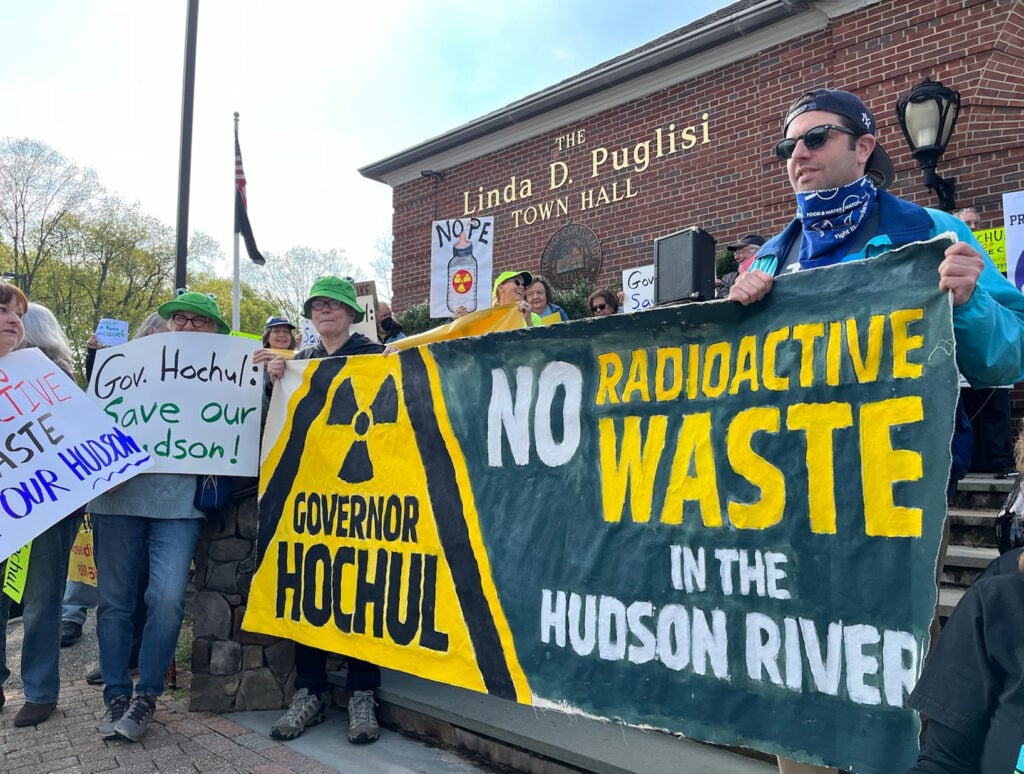
Iris: Also, with the resolutions, it was a way to educate your local politicians who might not have known anything about the issue and to get them on board. And one more thing — we wrote letters to the editor.2Letters to the editor, or LTEs, are written by members of the public to newspapers or magazines, to express thoughts on an issue in the community.
A lot of our effort was getting the word out, because as I said, anyone who heard about radioactive wastewater being dumped into the Hudson River was appalled. We needed to educate people about what was going on and the actions they might take to stop it.
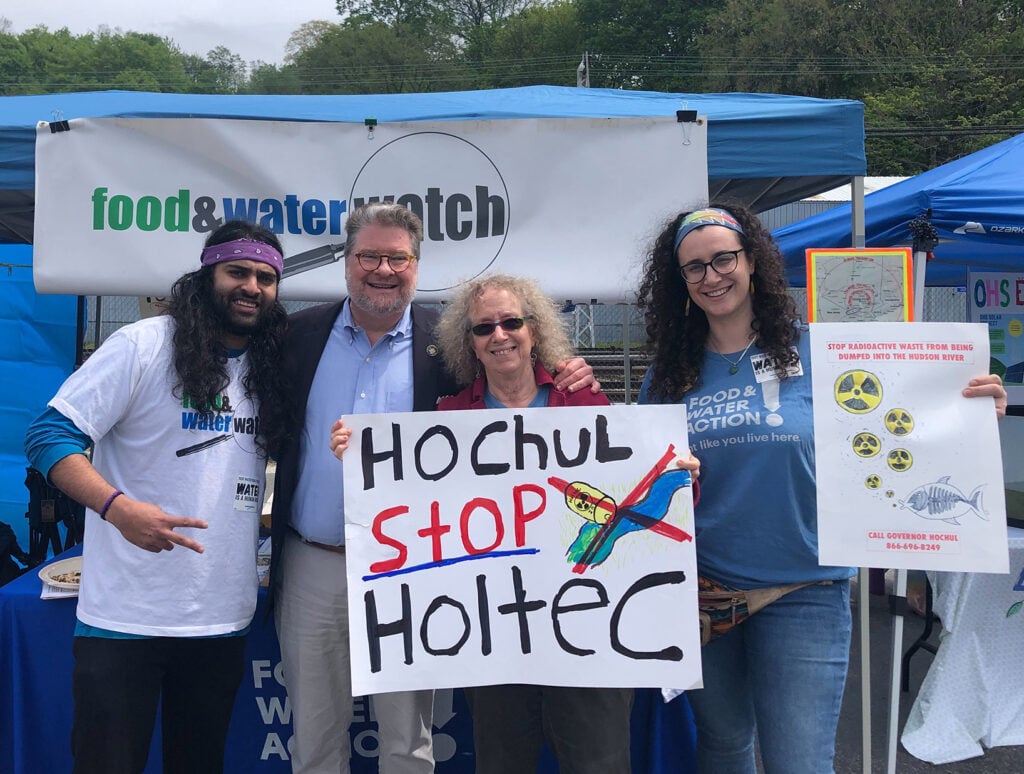
Building Relationships and People Power
Mia: What makes Food & Water Watch’s team, especially its volunteers, particularly unique or effective in fights like these?
Iris: In this case, fighting the radioactive dumping was a sprawling kind of movement, and somehow it all pulled together into the Stop Holtec Coalition with Santosh taking the lead on it, pulling the group together, and keeping it focused.
This wasn’t easy because there were so many different directions we could have focused on — you know, debating percentages of what radioactive chemical versus which agency to fight or which little legal fight to go after — so it constantly had the possibility of spinning off in some direction that might not get the result we wanted.
Food & Water Watch would pull it back into the political: “What is it we need to get done? We need this legislation passed, we need the Governor to sign the legislation.”
Santosh: This campaign wasn’t on the agenda. At the start of the year, I didn’t know we had to stop radioactive waste from getting dumped in the Hudson River. I think the reason we were able to scale it up: one, the reason Iris mentioned was that it’s very obvious no one wants radioactive waste in the water, so it’s not a hard pitch.
But we were only able to do it because of Iris and volunteer leaders like Iris, who just come in and pick it up and run with it. So that is ultimately, I think, what stands out — that our volunteers really mobilized and stepped up when we asked them to.
And it’s not easy to just stuff in an extra campaign. It’s not easy to even just stuff in an extra rally. I think that just speaks to what exists in New York, and what Iris has built and is continuing to build.
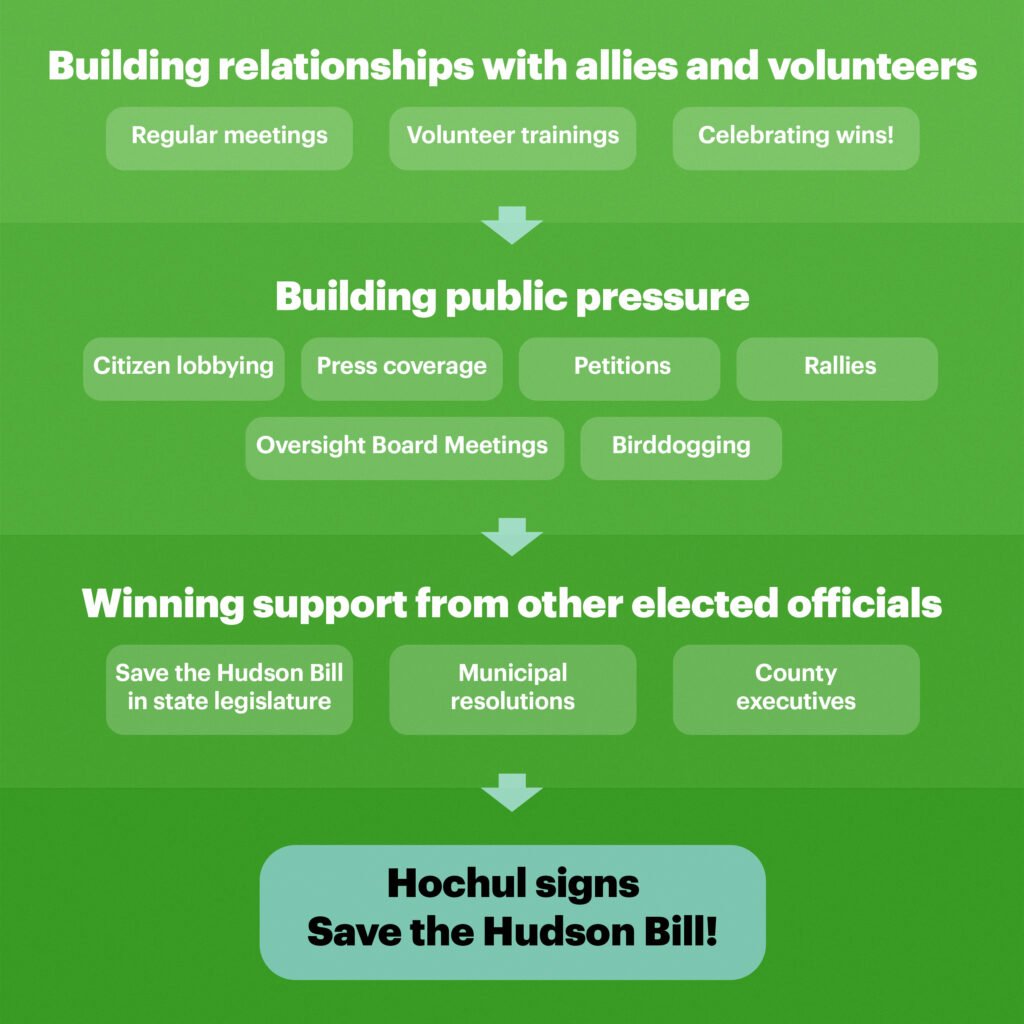
Iris: The New York team at least, which I particularly know — I’ve gotten to know all of them — I’m friends with them. When they call me and ask me to do something, I’m pretty much going to say yes. I’m going to believe it’s worth doing.
I’m going to think that they’ve thought through what kind of action makes sense, what will be the most effective thing. So if it’s Get on a bus to Albany, or Get on a bus to Washington, or whatever else it might be, I’m going to do that. There’s a lot of personal interaction and team-building, so you feel, as a volunteer, that you matter.
When Santosh asked me to speak at that Save the Hudson rally, I had really never done anything like that before, and so that was exciting. And so you’re just brought on, and you’re treated as though it matters that you’re there and that you have something to add. And I think that’s pretty unique. The volunteers aren’t just some little subset of the group, so I really feel like I’m a part of the Food & Water Watch New York team.
Now, I know many of the other volunteers, and we’re making more of a network of volunteers; getting to know each other. We had a convergence where we spoke with volunteers from all around the country, recently.
We had speakers, we had trainings, we taught each other things, we were taught by experts. And we got to learn about the issues in other parts of the country and see our commonalities. So that, to me, is totally unique from any other group I’ve worked with.
And it’s fun! Really, it’s important, but if it’s not fun — I think the fun brings you back. And the personal connections, seeing the other members of the team, wanting to do something with them, and enjoying it.
There’s a lot of action, whether it’s birddogging or yelling or drumming, or the more quiet actions, too. But it’s just fun to do, to get involved.
We can’t win victories like this without dedicated volunteers like Iris — and you!
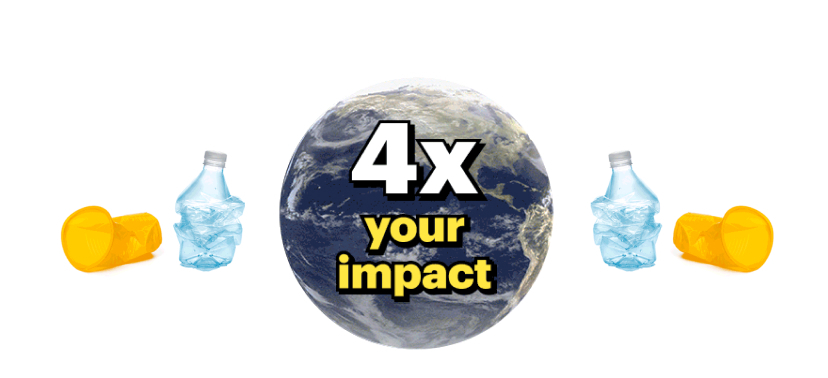
Time to face it —~it’s people or plastics.~We can’t have both.
Become a plastic pollution fighter this Earth~ Day and have your gift MATCHED $3-to-$1!
Enjoyed this article?
Sign up for updates.
TO TOP
Endnotes


